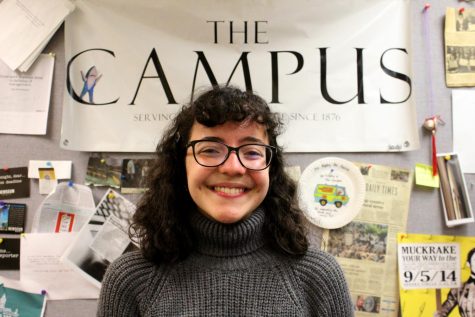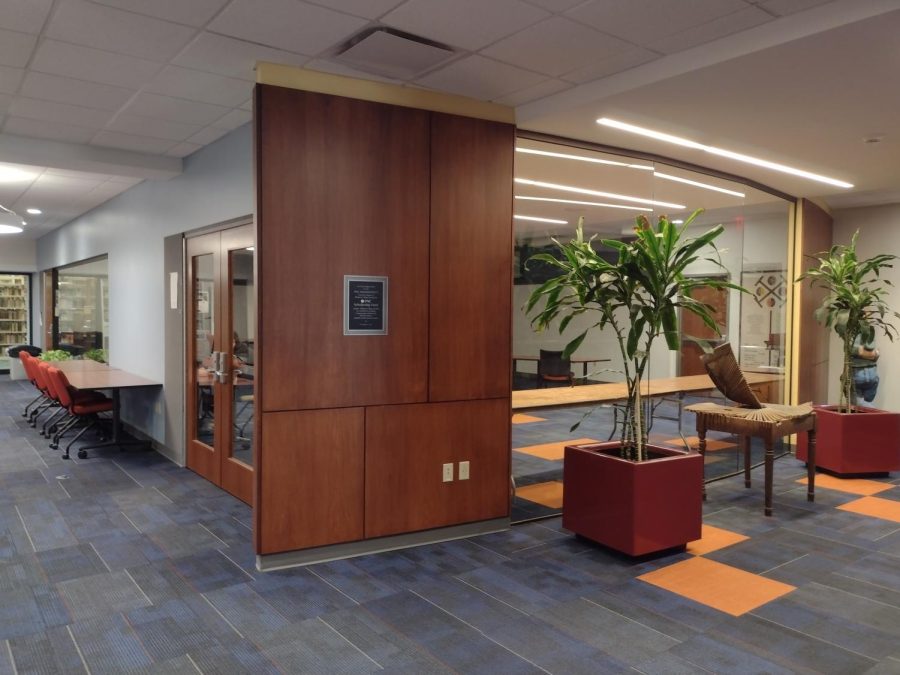Weekly community writing space established in Pelletier Collaboratory
The Collaboratory space on the third floor of the Pelletier Library, where the community writing space meets every Sunday from 7-9 p.m.
Students interested in working on their writing in the company of other writers now have a space to do so.
A weekly community writing space for students began on Sunday, Feb. 27, and is available in the Pelletier Collaboratory, on the second floor of the Lawrence Lee Pelletier Library, from 7-9 p.m. every Sunday.
Writers are not limited to coming in with academic work. According to a MyAllegheny post advertising the space, “(students) can be working on a class assignment, a comp, a job or graduate school application, a creative project, a letter to a family member, or a to-do list.”
“We really want to kind of infuse a culture of writing on campus,” said Professor of English and Director of Writing Alexis Hart.
Writing consultants will be present to give quick feedback. As writing consultant Lottie Mateyak, ’24, explained, this feedback is different from that given in typical consultant sessions, which are held in the back of the library on the ground floor in the Maytum Center for Student Success. Normal consultation sessions are for in-depth analysis of papers, as the consultant will go through the student’s paper paragraph by paragraph.
“Typical consultations are 30 minutes, and they have to be … scheduled, so (the writing space) is more so for writers who have just a quick question about MLA citations or, ‘do I need a comma here?’” Mateyak said. “This is just if you have a question or two, or if you want a writing accountability group to come in here and write as well.”
In terms of why the community writing space was created, Mateyak said that Hart, her supervisor, brought up the idea of the space at one of the weekly professional development meetings — mandatory meetings for writing consultants that occur on Wednesdays — and several of the consultants thought the idea was a good one, so they decided to establish the space during the 7-9 p.m. time block to see how it ran.
Hart said that she was not the first to think about the community writing space, though.
“(Writing consultant Sydney Emerson, ’23) was definitely one of the folks who immediately got the idea rolling,” Hart said. “One of the best things, I think, about being the director of writing and working with the writing consultants is that they often have the good ideas, and then I just try to figure out how to make them possible.”
According to Hart, a few of the writing consultants had heard about the Allegheny Writing Accountability Group, which is designed for faculty. They wanted to create something similar for students, where students can get together and write in a place that is “open” and “non-judgmental.”
Not only will a writing consultant be there to answer any questions, but also, since it is a community space, other writers can offer feedback. And as for the location, it was a proverbial no-brainer.
“The Collaboratory was kind of a logical space because it is in Pelletier, where a lot of students come to work, and the rest of the (writing consultant) staff is there in the (Maytum Center for Student Success),” Hart said.
Like Mateyak, Emerson said that the writing space was established as a place to ask a quick question, as opposed to receiving a 30-minute consultation, emphasizing that the collaborative aspect of the space was a key point in the rationale for setting it up. Conversations with other writing consultants about common patterns in those who come to consultations led to the idea of a room where students can gather and write.
“A few of us were talking about how sometimes we get writers who simply just want to be supervised while writing, like they need … supervision to get writing projects done,” Emerson said. “Some people do work better when other people are working near them.”
Currently, Mateyak is the only writing consultant scheduled to be in the space. Hart elaborated on this decision, explaining that given the other duties of writing consultants — including the two shifts per week and the professional development meetings — she did not have room in her schedule to put more than one consultant in the Collaboratory on Sunday evenings.
“Any one of the consultants would be capable of serving in that role,” Hart added. “If we start to see more interest, that might be a rationale for offering it more often and having more consultants rotate through, but we kind of wanted to run it as a pilot first.”
As Mateyak was sick Sunday, Feb. 27, Sunday, March 6 marked the first full run of the writing space. Hart has not yet gotten to speak with Mateyak to find out the number of writers who attended and the nature of the experience, but she emphasized that the program is still in its “early days.”
The writing space is not just for students who need help with their writing or for students with a due date looming on the horizon. It is also available for those who just want to write among others and be in the company of people all working on their craft.
“When you have a community of other writers in which you begin to write together and think together, it gives you energy to write yourself,” Hart said.

Sofia Hassan is a second-year student from New Castle, Pennsylvania. She plans to major in English Creative Writing and minor in Middle East and North...

Sami Mirza is a senior from many different places. He is majoring in International Studies with a focus on the Middle East and North Africa and minor in...










Prof Hart • Mar 11, 2022 at 10:56 am
Thank you for publishing this article, Sofia! We hope this publicity encourages writers to write together on Sundays. The writing consultant staff welcomes any feedback or suggestions. Our email is [email protected].